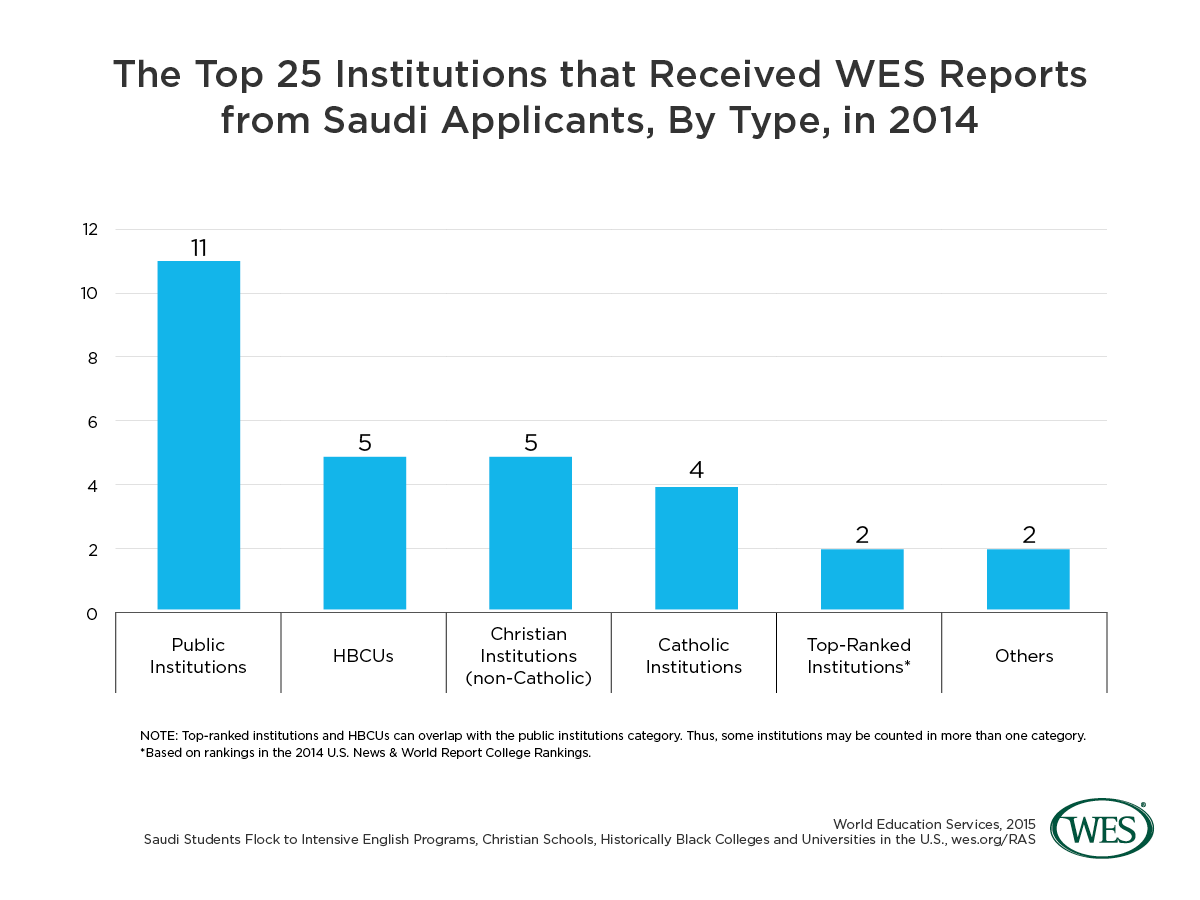By Bryce Loo, Research & Advisory Services, WES
In the 2013/14 academic year, Saudi Arabia was the fourth largest sender of students to the U.S. [1] with 53,919 students, up over 20% from the previous year. As the King Abdullah Scholarship Program (KASP) [2] has been extended to 2020 [3], growth of Saudi students in the U.S. will likely continue. However, little is known about where Saudi students study within the U.S. An analysis of WES applicant data along with national data can provide some insights into what types of institutions Saudi students apply to and attend. Our analysis shows that a diverse and sometimes surprising set of institutions have seen significant growth in their Saudi student populations. Similar institutions can likely target recruitment efforts among these students as well.
Saudis often apply to a wider range of schools other than the elite institutions that are a typical focus of international applicants. Nearly 40% of Saudi students [4] are Explorers, who have solid financial resources but lower academic preparedness, as shown by their high enrollment in Intensive English Programs (IEPs) prior to starting full degree programs1 [5]. At over 38,000 students [6] in 2013/14, Saudi Arabia was the leading country of origin for IEPs in the U.S., supplying roughly 30% of all students to these programs. These students are also more interested in the experiential aspects of a U.S. education [7] and less likely to focus on the top-ranked institutions favored by prospective Chinese students [8]. WES data confirm that only six of the top 25 institutions to which Saudi applicants sent WES evaluation reports were in the top national rankings of the 2014 U.S. News & World Report [9], with only two of them in the top 100.
Despite coming from a strongly Muslim country, many Saudi students apply to and attend Christian-affiliated institutions. Thirty-six percent of the top 25 institutions for WES Saudi applicants had a Christian denominational affiliation, including Roman Catholic, Lutheran, United Methodist, and Seventh-Day Adventist. Recent discussions [10] about Muslim students enrolled in Catholic universities [11], such as the Catholic University of America [12] in Washington, D.C., have shown that some students from the Muslim world feel more comfortable in a religious setting than in a secular one, even if not of their own religion. Saudis tend to be the largest group among these students.
Another unique group of institutions with significant numbers of Saudis is Historically Black Colleges and Universities (HBCUs) [13]. Five of the top 25 institutions to which WES Saudi applicants sent reports in 2014 were HBCUs. National data also show that Saudi Arabia is the top country of origin among international students at HBCUs [14], though these institutions have often struggled to attract international students [15]. Many have developed partnerships with institutions in Saudi Arabia, as is the case for Morgan State University in Baltimore [16]. These partnerships have largely been an outgrowth of growing domestic competition for students [17], coupled with the desire to internationalize, which has led many HBCUs to seek enrollment from abroad.
For many institutions, one very important factor to consider is that for any student coming to the U.S. through KASP, the institution must be approved by the Saudi Arabian Cultural Mission (SACM) [19], the entity charged with administering KASP. Many U.S. institutions, particularly those that do not already host large numbers of international students, may be able to enlarge their Saudi student populations by engaging with SACM to ensure that the institution and programs on campus are approved for KASP recipients. Additionally, forming partnerships with institutions in Saudi Arabia [3] may increase institutional name recognition among potential applicants and develop recruitment channels for Saudi students.
1. [20] KASP recipients can enroll up to one year in an intensive English program (IEP) with full funding [21], though it is believed that such training will soon be capped at six months. The Saudi Arabian Cultural Mission (SACM) [19], the government entity in charge of KASP, maintains a database of approved IEP programs [22] in the U.S.
Previous Mobility Monitors
- Increasingly Mobile and Educated: The Future of Canadian Immigration [23]
- Can U.S. Universities Compete in the Southeast Asian Transnational Education Market? [24]
- Career Prospects Driving International Engineering Students to the U.S. [25]
WES in the News
- Diversifying International Recruitment [26], NAFSA International Educator
- Four Trends That Are Shaping the Future of Global Student Mobility [27], ICEF Monitor
- Chinese Economy Shifting but Demand for Study Abroad Expected to Remain Strong [28], ICEF Monitor

